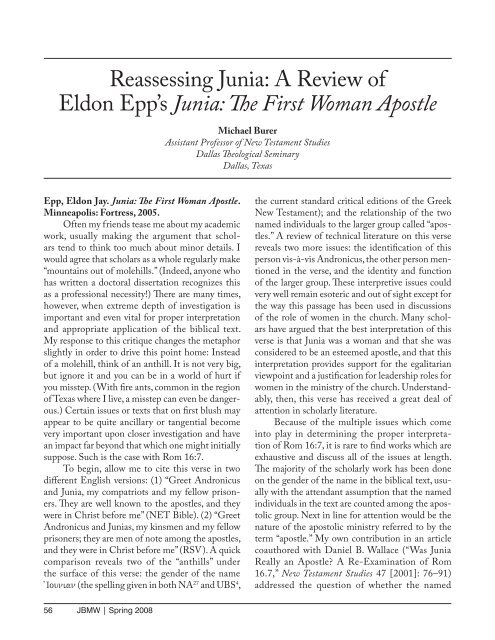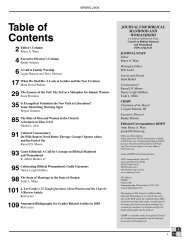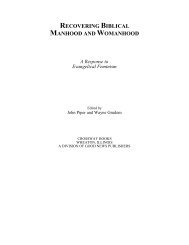Download PDF - The Council on Biblical Manhood and Womanhood
Download PDF - The Council on Biblical Manhood and Womanhood
Download PDF - The Council on Biblical Manhood and Womanhood
Create successful ePaper yourself
Turn your PDF publications into a flip-book with our unique Google optimized e-Paper software.
Reassessing Junia: A Review ofEld<strong>on</strong> Epp’s Junia: <str<strong>on</strong>g>The</str<strong>on</strong>g> First Woman ApostleMichael BurerAssistant Professor of New Testament StudiesDallas <str<strong>on</strong>g>The</str<strong>on</strong>g>ological SeminaryDallas, TexasEpp, Eld<strong>on</strong> Jay. Junia: <str<strong>on</strong>g>The</str<strong>on</strong>g> First Woman Apostle.Minneapolis: Fortress, 2005.Often my friends tease me about my academicwork, usually making the argument that scholarstend to think too much about minor details. Iwould agree that scholars as a whole regularly make“mountains out of molehills.” (Indeed, any<strong>on</strong>e whohas written a doctoral dissertati<strong>on</strong> recognizes thisas a professi<strong>on</strong>al necessity!) <str<strong>on</strong>g>The</str<strong>on</strong>g>re are many times,however, when extreme depth of investigati<strong>on</strong> isimportant <strong>and</strong> even vital for proper interpretati<strong>on</strong><strong>and</strong> appropriate applicati<strong>on</strong> of the biblical text.My resp<strong>on</strong>se to this critique changes the metaphorslightly in order to drive this point home: Insteadof a molehill, think of an anthill. It is not very big,but ignore it <strong>and</strong> you can be in a world of hurt ifyou misstep. (With fire ants, comm<strong>on</strong> in the regi<strong>on</strong>of Texas where I live, a misstep can even be dangerous.)Certain issues or texts that <strong>on</strong> first blush mayappear to be quite ancillary or tangential becomevery important up<strong>on</strong> closer investigati<strong>on</strong> <strong>and</strong> havean impact far bey<strong>on</strong>d that which <strong>on</strong>e might initiallysuppose. Such is the case with Rom 16:7.To begin, allow me to cite this verse in twodifferent English versi<strong>on</strong>s: (1) “Greet Andr<strong>on</strong>icus<strong>and</strong> Junia, my compatriots <strong>and</strong> my fellow pris<strong>on</strong>ers.<str<strong>on</strong>g>The</str<strong>on</strong>g>y are well known to the apostles, <strong>and</strong> theywere in Christ before me” (NET Bible). (2) “GreetAndr<strong>on</strong>icus <strong>and</strong> Junias, my kinsmen <strong>and</strong> my fellowpris<strong>on</strong>ers; they are men of note am<strong>on</strong>g the apostles,<strong>and</strong> they were in Christ before me” (RSV). A quickcomparis<strong>on</strong> reveals two of the “anthills” underthe surface of this verse: the gender of the namevIounian (the spelling given in both NA 27 <strong>and</strong> UBS 4 ,the current st<strong>and</strong>ard critical editi<strong>on</strong>s of the GreekNew Testament); <strong>and</strong> the relati<strong>on</strong>ship of the tw<strong>on</strong>amed individuals to the larger group called “apostles.”A review of technical literature <strong>on</strong> this versereveals two more issues: the identificati<strong>on</strong> of thispers<strong>on</strong> vis-à-vis Andr<strong>on</strong>icus, the other pers<strong>on</strong> menti<strong>on</strong>edin the verse, <strong>and</strong> the identity <strong>and</strong> functi<strong>on</strong>of the larger group. <str<strong>on</strong>g>The</str<strong>on</strong>g>se interpretive issues couldvery well remain esoteric <strong>and</strong> out of sight except forthe way this passage has been used in discussi<strong>on</strong>sof the role of women in the church. Many scholarshave argued that the best interpretati<strong>on</strong> of thisverse is that Junia was a woman <strong>and</strong> that she wasc<strong>on</strong>sidered to be an esteemed apostle, <strong>and</strong> that thisinterpretati<strong>on</strong> provides support for the egalitarianviewpoint <strong>and</strong> a justificati<strong>on</strong> for leadership roles forwomen in the ministry of the church. Underst<strong>and</strong>ably,then, this verse has received a great deal ofattenti<strong>on</strong> in scholarly literature.Because of the multiple issues which comeinto play in determining the proper interpretati<strong>on</strong>of Rom 16:7, it is rare to find works which areexhaustive <strong>and</strong> discuss all of the issues at length.<str<strong>on</strong>g>The</str<strong>on</strong>g> majority of the scholarly work has been d<strong>on</strong>e<strong>on</strong> the gender of the name in the biblical text, usuallywith the attendant assumpti<strong>on</strong> that the namedindividuals in the text are counted am<strong>on</strong>g the apostolicgroup. Next in line for attenti<strong>on</strong> would be thenature of the apostolic ministry referred to by theterm “apostle.” My own c<strong>on</strong>tributi<strong>on</strong> in an articlecoauthored with Daniel B. Wallace (“Was JuniaReally an Apostle? A Re-Examinati<strong>on</strong> of Rom16.7,” New Testament Studies 47 [2001]: 76–91)addressed the questi<strong>on</strong> of whether the named56 JBMW | Spring 2008




